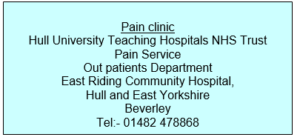- Reference Number: HEY-1354-2023
- Departments: Pain Medicine, Pharmacy
- Last Updated: 1 May 2023
Introduction
You have been given this leaflet because you have been prescribed Gabapentin tablets.
What is Gabapentin?
Gabapentin is used to treat some types of persistent pain. It is especially good for nerve pain, such as burning, shooting or stabbing pain.
Gabapentin belongs to a group of medicines called anticonvulsants which are also used to treat epilepsy.
Gabapentin works by changing the way that nerves send messages to your brain. If the messages are reduced, then the pain will be reduced.
How do I take Gabapentin?
You may need to take this medicine for a few weeks before you feel any change in your pain.
Normally, the starting dose is small and may be taken between one and three times a day, but the dose will be gradually increased. You will be told what dose to start taking and how to increase the dose. The table below will help to guide you.
If you are taking antacid medication it is best to wait for two hours after taking it before taking gabapentin.
| Date | Morning | Lunch | Teatime | Evening |
Important
If you feel you are gaining significant pain relief stop at this dose of medication, you don’t have to increase the dose further.
You may need to take this medicine for a few days or weeks before you get any pain relief. The dose may need to be gradually increased. It cannot be started at a high dose, as this usually causes side effects. Some people get pain relief at low doses; other people need higher doses. Once we find the right dose for you, you will need to continue to take the medicines for as long as you have the pain.
How long will I need to take Gabapentin?
This will depend on why you are taking Gabapentin and how your pain responds to treatment. You can continue to take Gabapentin for as long as it helps your pain if you are not having any side effects. It may be necessary for your doctor to change the dose during your treatment.
Can I drink alcohol?
The combination of Gabapentin and alcohol can cause significant drowsiness if you have just started on this medicine or the dose has recently been increased. We advise you not to drink alcohol when you first start this medicine and while we are increasing the dose. Once you are on a stable dose and the drowsiness caused by the Gabapentin stops, you may drink alcohol in moderation.
Can I take other medicines together with Gabapentin?
The absorption of Gabapentin is affected by certain indigestion/antacid mixtures. Always tell your doctor, nurse or pharmacist which other medicines you are taking or buying, so they can make sure there are no interactions between your medicines.
Are there side effects from taking Gabapentin?
You are also advised to read the information leaflet that will be included with your medication.
- The most common side effects are dizziness and tiredness – if you are affected by this do not drive or operate machinery.
- Less common side effects are diarrhoea, dry mouth, swelling, weight gain, memory loss, abnormal thinking and rash
- Uncommon side effects are muscle weakness or pain, constipation, flatulence, nausea, confusion, decreased sensitivity to touch.
Usually these side effects will pass but if they do not or you find them troublesome, or you experience any unusual affects you should discuss this with your GP, especially if you feel that you are not able to walk as normal, are forgetful, confused, or experience visual disturbance or nausea.
Do not suddenly stop taking your medicine. The dose should be lowered gradually. Call your doctor or nurse for directions.
However, if you are concerned about any side effects e.g. if you get a rash, swelling etc, speak to your Doctor/Pharmacist/Nurse as you may need to stop this medicine immediately. If you have any doubts/concerns and cannot speak to a health care professional, stop the medicine. Some people can stop this medicine suddenly and have no problems; however some people may get withdrawal symptoms if it is stopped suddenly such as insomnia, headache, flu syndrome, anxiety etc which should only last a few days. These symptoms are more likely to occur if people have been on this medicine for more than a few months.
REMEMBER
- Don’t run out of medicine
- Remember to ask for a repeat prescription before your tablets are finished.
- If you have taken too many tablets please contact your GP or attend accidents and emergency.
Can I drive?
You should not drive if your judgment is impaired by this medication.
Further information on Drug driving can be found at;-https://www.gov.uk/drug-driving-law
What do I do if I forget to take a regular dose of Gabapentin?
If you forget to take a dose take it as soon as you remember unless it is time to take the next dose. Do not take two doses at the same time.
Discontinuation
If you experience any side effects whilst increasing your Gabapentin dose (apart from drowsiness which is usually temporary), please reduce the dose back to the level where you had no side effects or discontinue this medicine. To discontinue this medicine it is best to reduce the dose slowly 1-2 weeks, you should seek medical advice in this matter.
Who should I phone if I need advice urgently about my Gabapentin?
If you have any queries do not hesitate to contact the pain clinic Monday to Friday 9am till 4pm.

Outside the normal pain clinic hours (Monday to Friday 9am till 4pm) you can contact your own GP within their working hours.
Out of these hours if you have any queries, contact NHS111 and inform them that you are taking Gabapentin. They will then be able to contact the pain/palliative medicine consultant on duty for advice.
This leaflet was produced by Centre for Pain medicine and Pharmacy department, Hull University Teaching Hospitals NHS Trust and will be reviewed in May 2026
General Advice and Consent
Most of your questions should have been answered by this leaflet, but remember that this is only a starting point for discussion with the healthcare team.
Consent to treatment
Before any doctor, nurse or therapist examines or treats you, they must seek your consent or permission. In order to make a decision, you need to have information from health professionals about the treatment or investigation which is being offered to you. You should always ask them more questions if you do not understand or if you want more information.
The information you receive should be about your condition, the alternatives available to you, and whether it carries risks as well as the benefits. What is important is that your consent is genuine or valid. That means:
- you must be able to give your consent
- you must be given enough information to enable you to make a decision
- you must be acting under your own free will and not under the strong influence of another person
Information about you
We collect and use your information to provide you with care and treatment. As part of your care, information about you will be shared between members of a healthcare team, some of whom you may not meet. Your information may also be used to help train staff, to check the quality of our care, to manage and plan the health service, and to help with research. Wherever possible we use anonymous data.
We may pass on relevant information to other health organisations that provide you with care. All information is treated as strictly confidential and is not given to anyone who does not need it. If you have any concerns please ask your doctor, or the person caring for you.
Under the General Data Protection Regulation and the Data Protection Act 2018 we are responsible for maintaining the confidentiality of any information we hold about you. For further information visit the following page: Confidential Information about You.
If you or your carer needs information about your health and wellbeing and about your care and treatment in a different format, such as large print, braille or audio, due to disability, impairment or sensory loss, please advise a member of staff and this can be arranged.

